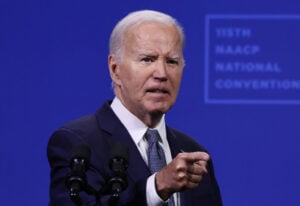In a rare moment of bipartisan acknowledgment, President Joe Biden publicly commended Donald Trump for his role in brokering a historic peace deal between Israel and Hamas, marking one of the first sustained ceasefires since the devastating conflict began in October 2023.
The humanitarian crisis in Gaza had escalated dramatically over two years of violence, with reports estimating that tens of thousands of civilians, including thousands of children, lost their lives amid relentless fighting. The announcement of a ceasefire — accompanied by the release of all remaining hostages — has been widely celebrated as a critical first step toward lasting peace in the region.
A Ceasefire That Offers Hope
According to reports from the BBC, the deal outlines a three-phase plan designed to gradually scale down Israeli military presence in Gaza. The initial withdrawal will reduce occupation to roughly 55 percent of the territory, followed by a second phase lowering it to about 40 percent. The final phase introduces a security buffer zone, leaving approximately 15 percent of Gaza under Israeli control while international monitors oversee compliance.
Though much work remains to be done, the agreement has been hailed as the most promising diplomatic progress in years — one that many attribute to the renewed engagement of U.S. diplomacy.
Trump’s Role in the Peace Process
President Trump announced the deal last week in a celebratory post on Truth Social, where he took credit for helping both sides reach common ground after months of indirect negotiations.
“I am very proud to announce that Israel and Hamas have both signed off on the first Phase of our Peace Plan,” Trump wrote. “This means that ALL of the hostages will be released very soon, and Israel will withdraw their troops to an agreed-upon line as the first steps toward a strong, durable, and everlasting peace.”
He went on to thank mediators from Qatar, Egypt, and Turkey for their roles in facilitating the discussions, adding, “All parties will be treated fairly! This is a great day for the Arab and Muslim world, Israel, all surrounding nations, and the United States of America. Blessed are the peacemakers.”
While Trump’s rhetoric has often drawn criticism for self-promotion, even his detractors have acknowledged the significance of this diplomatic achievement.
Biden’s Surprising Response
What surprised many observers, however, was President Biden’s measured praise for his predecessor. Posting on X (formerly Twitter), Biden applauded the outcome of the peace talks while emphasizing the contributions of his own administration.
“I am deeply grateful and relieved that this day has come — for the last living hostages who have been through unimaginable hell and are finally reunited with their families, and for the civilians in Gaza who have suffered immeasurable loss and will finally get the chance to rebuild their lives,” Biden wrote.
He continued:
“The road to this deal was not easy. My administration worked relentlessly to bring hostages home, get relief to Palestinian civilians, and end the war. I commend President Trump and his team for their work to get a renewed ceasefire deal over the finish line. Now, with the backing of the United States and the world, the Middle East is on a path to peace that I hope endures — a future for Israelis and Palestinians alike with equal measures of peace, dignity, and safety.”
The statement marked one of the few times Biden has directly acknowledged Trump’s efforts in international diplomacy — a gesture that surprised both allies and critics.
Political and Global Reactions
Political analysts described Biden’s statement as an “unusual but meaningful moment of unity” in a deeply divided political climate. Many foreign policy experts agreed that acknowledging bipartisan cooperation could strengthen America’s credibility as a mediator in future Middle East negotiations.
Meanwhile, leaders across the globe — including officials from the United Nations and the European Union — have praised the ceasefire as a “critical humanitarian breakthrough.” International aid organizations are already preparing to deliver food, medicine, and rebuilding supplies to the battered Gaza Strip.
Renewed Tensions Beneath the Surface
Despite the wave of optimism, both Israeli and Palestinian officials have cautioned that the peace deal represents only a beginning, not a conclusion. The region remains fraught with mistrust, political complexity, and humanitarian challenges.
And while Trump’s team celebrates what he has called “a once-in-a-century peace achievement,” tensions between the two U.S. presidents remain apparent.
Just days after Biden’s message, Trump fired back during an exchange with reporters aboard Air Force One, saying:
“We had an incompetent administration. We had an incompetent president. And because of a crooked election, millions of people are dead. And by the way, the Israeli thing was much harder to get settled because of the past administration.”
The comments drew swift criticism but also underscored the complicated relationship between the two men — rivals in politics, yet now linked by one of the most significant diplomatic milestones in recent years.
A Moment of Cautious Hope
For now, the ceasefire offers a rare moment of hope amid two years of devastating conflict. Families on both sides of the border are reuniting, humanitarian aid is flowing, and for the first time in years, the prospect of long-term peace seems possible.
Whether the truce will hold — and whether it marks the beginning of a broader reconciliation — remains to be seen. But as world leaders cautiously celebrate, one truth stands out: diplomacy, even between adversaries, can still change the course of history.



